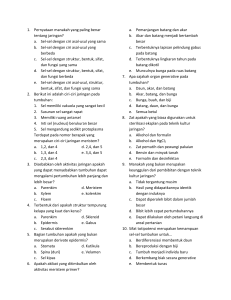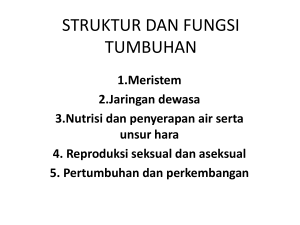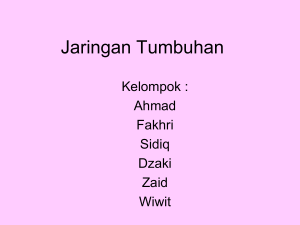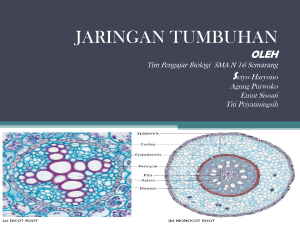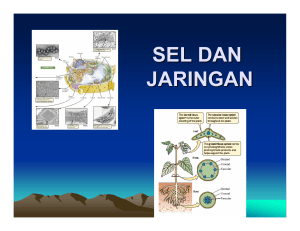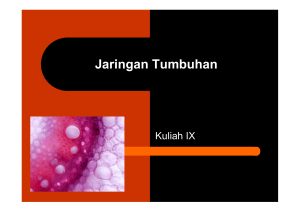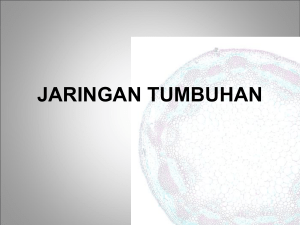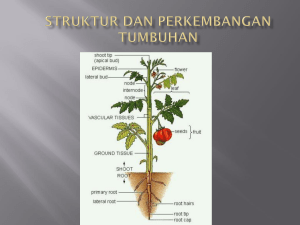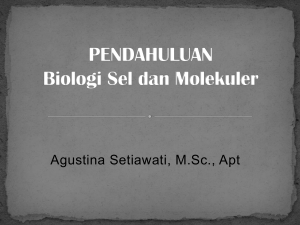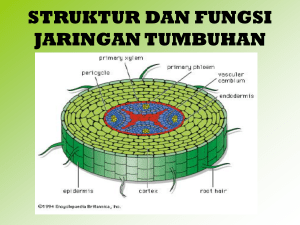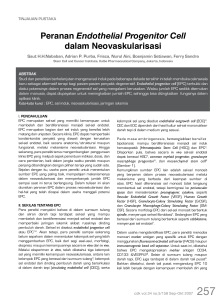ENI NURAENI, M. Pd - Direktori File UPI
advertisement
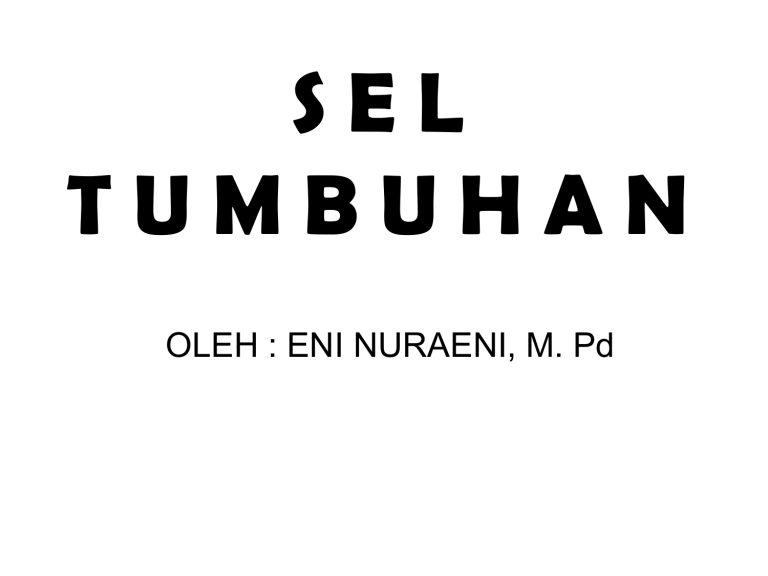
SEL TUMBUHAN OLEH : ENI NURAENI, M. Pd Sejarah Penemuan Sel • In 1838, M. SCHLEIDEN postulated the cell theory, which states that every plant is organized from cells. • In 1839, T. SCHWANN showed that it applies to animals as well and • in 1855 VIRCHOW coined the phrase: "Omnis cellula e cellula" • The German botanist H. v. MOHL was the first to observe the propagation of plant cells by division in 1835. • Around the middle of the 19th century, the cellular organization of plant tissues was mostly outlined. • Illustrated textbooks were published. J. v. SACHS' textbook "Lehrbuch der Botanik" (A Textbook on Botany; first edition published in 1868) and its sequel "Vorlesungen über Pflanzenphysiologie" (Lectures on Plant Physiology) were outstanding and pointing the way. I • • The examinations of the 19th century were mostly restricted to the observation and interpretation of longitudinal and cross-sections through different plant organs. In the 20th century it was concentrated more on problems of the development of special tissues in the course of ontogenesis and evolution (phylogenesis). It was and is tried to understand the plant body as a three-dimensional structure, and to get an idea of the meaning of the spatial arrangements of single tissues towards each other. SEL TUMBUHAN • Sel tumbuhan memiliki bentuk dan fungsi yang bervariasi. • terdiri dari protoplas yang dikelilingi oleh dinding sel. • The content of a plant cell (the protoplasm) changes in composition in the course of growth and development. • Differentiated cells are marked by a voluminous vacuole. • Cells are no static objects. • Very often, plasma currents occur that can be detected by the movements of organelles like chloroplasts or different granules. Most of these movements have a direction and sometimes it even looks as if single particles would move along rails. Protoplas • The "living" content of a cell, surrounded by a membrane called plasmamembrane or plasmalemma. • Protoplas adalah bagian keseluruhan sel yang terdiri atas komponen protoplasma dan komponen non protoplasma. Protoplas Komponen Protoplasma • Protoplasma di dalam sel diartikan sebagai komponen sel yang merupakan koloid berstruktur kompleks. Protoplasma terdiri atas sitoplasma dan inti sel (nukleus). • Komponen Non Protoplasma • Bagian bukan protoplasma terdiri, vakuola dengan zat ergastik. Cell Wall • It is flexible and distortable during growth, but loses its ability for distortion after growth has stopped • distinguished between primary and secondary cell walls. • The secondary cell walls of many cells, especially those of vascular tissues, are incrusted with strengthening material. • Two important ones are: – lignin, the ground substance of wood and – suberin, the ground substance of cork DINDING SEL Function • provide mechanical support and protection • restricts size and shape of mature cell (allows turgor pressure to occur) • affects absorption, transpiration, translocation, secretion DINDING SEL • Struktur terluar (KEC; sel-sel kelamin pada tumbuhan tingkat rendah dan tumbuhan tingkat tinggi) • selulosa. hemiselulosa, pektin, protein, lignin (zat kayu), dan suberin (zat gabus) relatif lebih kaku dan bentuknya tetap. • Ketebalan dinding sel tumbuhan tergantung dari usia dan jenis selnya. • Dinding yang pertama kali dibentuk disebut dinding primer, dinding yang dibentuk kemudian adalah dinding sekunder yang bersifat lebih kaku • terdapat plasmodesmata, yaitu lubang/saluran yang menghubungkan sitoplasma dua sel yang berdampingan bermacam-macam Selulosa mikrofibril makrofibril Cells are Connected • in multicellular organisms, cells must be connected, that is, the cytoplasm • of one cell must be connected to the cytoplasm of its neighboring cells so that transport and communication can occur. This is accomplished in various ways. NOKTAH Dinding Sekunder Dinding primer Lamela tengah NOKTAH TERLINDUNG NOKTAH SEDERHANA STRUKTUR NOKTAH Noktah sederhana SITOPLASMA • Terdapat ORGANEL, EX: PLASTIDA, • 85-90% air, • sisanya senyawa-senyawa terlarut dalam sitoplasma PLASTIDA • Organel yang sangat dinamis, mampu membelah, tumbuh, dan berdiferensiasi menjadi berbagai bentuk. • Leukoplas atau proplastida, tidak berwarna (sel muda plastida biasanya) • Amiloplas, Leukoplas dapat membentuk butir pati (jaringan yang tidak terkena cahaya). • Elailoplas leukoplas juga dapat membentuk minyak atau lemak (epidermis daun Vanilla) • Kromoplas • Kloroplas Chromoplasts are red, orange or yellow plastids. The color is usually the result of yellow xantophyll and yellow to red carotinoids. The guard cells, for example, contain leucoplasts, that are permanently exposed to light without developing into chloroplasts. Starch is produced by the polymerization of glucose residues (products of photosynthesis) A. Model of a starch grain structure. The single lines symbolize starch molecules. They are arranged in a radial pattern. B. Layering of the starch grains. a. Formation center and layer borders, b. Diagram of the refraction conditions. The ordinate shows the refraction index. (according to A. FREYWYSSLING, 1938) BUTIR PATI • potato tubers have a diameter of 70 - 100 µm, • endosperm of wheat 30 - 45 µm • corn endosperm 12 - 18 µm • A starch grain is therefore organized like a crystal (semi-crystalline). VAKUOLA • • • • Vakuola dibatasi oleh membran yang identik dengan membran sel (tonoplas) terdiri dari air dan zat-zat terlarut (gula, berbagai garam, protein alkaloida, zat penyamak (tanin), dan zat warna (pigmen), kristal, serabut, dan partikel mempertahankan tekanan turgor dengan menyerap air dan memberikan tekanan ke dinding sel dari arah dalam mensekresikan proton (H+) • menyimpan cadangan makanan misalnya vakuola sentral yang menyimpan senyawa organik dan ion anorganik • mengeluarkan air berlebih dari dalam sel (vakuola kontraktil ) • mengurai dan mendaur ulang organel yang tua dan tidak dipakai. • and it occupies a large volume of the cell (up to 90%); in meristematic cells can see several small vacuoles (collectively the vacuome); the tonoplast (surrounding membrane) is differentially permeable and functions in osmotic regulation, especially maintenance of turgor; other functions of vacuole include biochemical recycling of materials (e.g.,storage and digestion) • • • ZAT ERGASTIK • • • • PAHIT PATI, butir pati PROTEIN (ALEURON), pada biji LIPID, minyak dan lemak; terpen, minyak atsiri (jar. Sekresi); biji dan buah; • KRISTAL, kalsium oksalat; soliter (Citrus, Begonia, Vicia sativa); drus (Opuntia, Ficus Indica) rafida (Impatien) Kristal Crystalline aggregations are called druses, bundles of needle-shaped crystals are termed raphids. Scanning electron microscopic images: Top picture: Calcium oxalate druse in the mesophyll cells of an oleander leaf (Nerium oleander). Typical druse shape of dicots. Middle picture: Calcium oxalate needles (raphids) of a vanilla root (Orchidaceae). Typical raphid bundle of monocots. Lowest picture: Silicate bodies of silicate cells in the epidermis of Schizachyrium sanguineum (a gramineaen species of the old world tropics). Characteristic mineralization of a gramineaen cell. [W. BARTHLOTT, MARTENS, 1979 (c), W. BARTHLOTT, unpublished (a, b)] SEL PARENKIM VAKUOLA Bagian sel tumbuhan JARINGAN TUMBUHAN • • • • • • Meristem Protektif Parenkim Sklerenkim Kolenkim Pengangkut Three main types of tissue are • • • Tissue Dermal epidermis periderm Vascular phloem xylem Fundamental Parenchyma Collenchyma Sclerenchyma Simple Complex X X X X X X X MERISTEM Berdasarkan asalnya, meristem dibagi menjadi dua yaitu: • meristem primer, yaitu meristem yang sel-selnya merupakan perkembangan langsung dari sel-sel embrional. (ujung akar dan kuncup daun) • meristem sekunder, yaitu meristem yang berasal dari jaringan dewasa yang telah mengadakan diferensiasi. (Kambium dan kambium gabus) Berdasarkan letaknya, meristem dibedakan menjadi • meristem apikal, letaknya pada ujung-ujung tumbuhan • meristem lateral, letaknya pada daerah tepi sejajar dengan keliling organ tempat jaringan ini ditemukan (kambium dan kambium gabus) • meristem interkalar, yaitu meristem yang letaknya diantara jaringan dewasa ( ruas-rusa batang tumbuhan) PARENKIM Fungsi yang bermacam-macam. • aerenkim. • klorenkim. • menyimpan cadangan makanan • parenkim penyimpan air. JARINGAN PARENKIM EPIDERMIS • • • • • • satu lapis sel-sel yang berbentuk segi empat. dinding sel yang tebal dan tidak mengandung kloroplas. rapat kutikula zat gabus (batang tembakau) modifikasi membentuk derivat-derivat (turunan): •Stoma •Trikoma •Spina (mawar) •rambut akar

